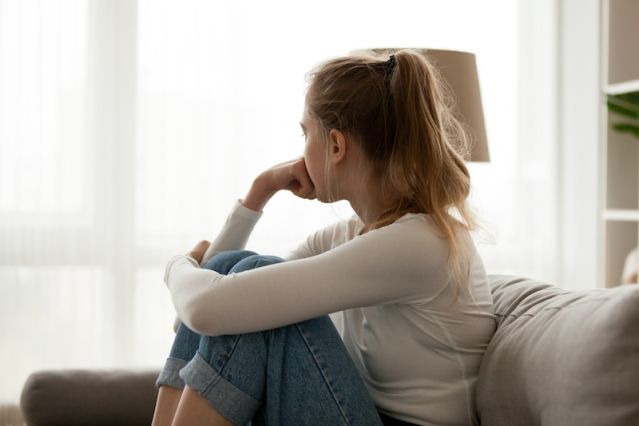Loneliness
How Emotional Neglect Can Cause Lifelong Lonely Feelings
Having your feelings go unacknowledged makes you feel alone in the world.
Posted January 2, 2024 Reviewed by Michelle Quirk
Key points
- Loneliness is a feeling that you can have even when you're surrounded by people.
- Feeling alone in the world is a characteristic that many who grew up with emotional neglect share.
- Healing emotional neglect reconnects you with your unacknowledged feelings and eases the lonely feelings.

It’s a beautiful summer evening, a bustling city full of hope and adventure. Carol sits alone in her condo, looking outside at the world with a pit in her stomach. She sees couples holding hands, groups of friends laughing and joking, and people with seemingly important places to be. Wistfully, she wonders why she feels fundamentally apart and different from all those people.
Loneliness is a part of the human condition. We all experience it from time to time. But research shows that loneliness is becoming pervasive, especially due to technology (Bonsaksen, Ruffolo, & Price, et al., 2023), social media, and the recent pandemic (Wollast, Preece, Schmitz, 2023). More and more people are living alone than ever before. These research studies tell us that loneliness is detrimental to our physical and mental health and can even decrease longevity.
Loneliness is not the same as being alone. You can be alone and not feel lonely, just as you can feel lonely when you aren’t alone. Loneliness and alone don't always go together. Alone is a state of being, while lonely is a feeling.
First, let’s take a look at the different kinds of loneliness. Then, I’ll explain why some people experience the feeling of loneliness more so than others.
Understanding Loneliness: 2 Different Kinds
1. Lonely because you’re alone: This type of loneliness creeps in when you are solo. It’s when you are glaringly aware that you are not with others and that other people are together, connecting, and having fun without you. Perhaps you feel this loneliness when you are at home sick while your friends hang out or when you are new to town and don’t have friends to ask over. This feeling is painful, especially when it’s difficult to find people to connect with. However, it does go away when you are in the presence of others.
2. Lonely even when you aren’t alone: This type of loneliness creeps in when you are alone, but it can also creep in when you are surrounded by people … even people who love and care for you. This lonely feeling is relentless. It follows you throughout your day-to-day life and may have been with you for a long, long time. In fact, this type of loneliness stems from childhood. People who experienced this type of loneliness learned a poignant, never directly spoken message: You are alone in this world.
That message is cultivated by childhood emotional neglect, where your feelings were ignored, discounted, or sometimes even silenced by your parents as you grew up. Your feelings are the core of who you are as a human being. So, when your feelings get tamped down as a child—with no one to listen to them, respond, or validate them—you are prone to feel on a deep level that you are very much alone in this world.
This ingrained feeling does not leave you once you leave your parent’s house and enter adulthood. It stays with you and sometimes surfaces with that deep, achy, lonely feeling.
From Loneliness to Connectedness
Childhood emotional neglect and feelings of loneliness are not a life sentence. Actually, there is a well-worn path toward healing. Many people have taken the steps to heal, and you can, too.
As a child, your emotions were treated as unimportant. Today, chances are high that you treat your emotions as unimportant, too, just as you were modeled. Now, it’s time to do the opposite. Treat your feelings the way they were meant to be treated: as important.
When you push down your feelings, you push down the very thing that allows you to connect, engage, and relate to others. The wall between you and your feelings is felt by the people around you. And that wall keeps you feeling lonely, whether you are alone or in the company of others.
Putting It into Practice
Once Carol became aware of her childhood emotional neglect, she started to engage with her emotions differently. When loneliness crept in, she learned how to identify and describe her emotional experience much better. Here are some of the feelings that led to Carol's sense of being different and alone: sad, empty, unloved, lost, rejected, unseen, on the outside, bereft, and singular.
Carol also did some work to figure out where these emotions were coming from. Yes, some of her feelings were because she was alone and disconnected from others, but most of her feelings were because of that wall standing between her and her emotions. Carol wasn’t prone to rejection. Carol was simply rejecting herself.
Chipping away at the wall between you and your emotions is one of the most powerful things you can do in your life. Doing this allows you to connect with others on a deep, personal level, showing your truest self to people who love you for the real you. And, most profoundly, chipping away at your wall allows you to connect with yourself.
The relationship you have with yourself is the most important relationship you have in your life, and it will continue to be throughout your lifetime. When you can treat your feelings as important, the old message that you are alone in this world will lessen. Healing your childhood emotional neglect comes with a deep and new realization: You are not alone in this world after all.
© Jonice Webb, Ph.D.
References
To determine if you might be living with the effects of childhood emotional neglect, you can take the free Emotional Neglect Questionnaire. You'll find the link in my bio.
Bonsaksen, Tore, Ruffolo, Mary, Price, Daicia, Leung, Janni, Thygesen, Hilde, Lamph, Gary, Kabelenga, Isaac, & Geirdal, Amy Østertu. Associations between social media use and loneliness in a cross-national population: Do motives for social media use matter? Health Psychology and Behavioral Medicine, Vol 11(1), Dec 2023, Article 2158089
Wollast, Robin, Preece, David A., Schmitz, Mathias, Bigot, Alix, Gross, James J., & Luminet, Olivier. The role of self-compassion in loneliness during the COVID-19 pandemic: A group-based trajectory modelling approach. Cognition and Emotion, Oct 26, 2023.




